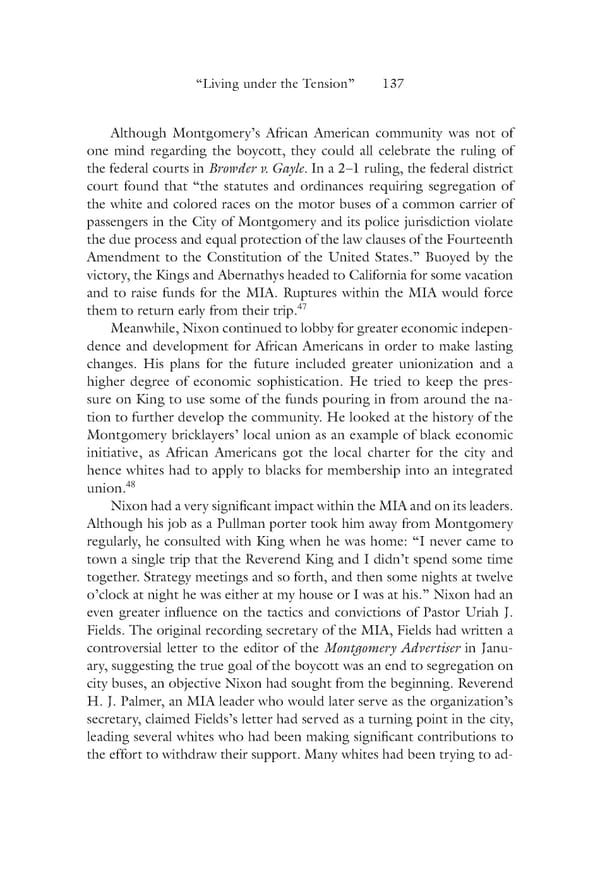“Living under the Tension” 137 Although Montgomery’s African American community was not of one mind regarding the boycott, they could all celebrate the ruling of the federal courts in Browder v. Gayle. In a 2–1 ruling, the federal district court found that “the statutes and ordinances requiring segregation of the white and colored races on the motor buses of a common carrier of passengers in the City of Montgomery and its police jurisdiction violate the due process and equal protection of the law clauses of the Fourteenth Amendment to the Constitution of the United States.” Buoyed by the victory, the Kings and Abernathys headed to California for some vacation and to raise funds for the MIA. Ruptures within the MIA would force 47 them to return early from their trip. Meanwhile, Nixon continued to lobby for greater economic indepen- dence and development for African Americans in order to make lasting changes. His plans for the future included greater unionization and a higher degree of economic sophistication. He tried to keep the pres- sure on King to use some of the funds pouring in from around the na- tion to further develop the community. He looked at the history of the Montgomery bricklayers’ local union as an example of black economic initiative, as African Americans got the local charter for the city and hence whites had to apply to blacks for membership into an integrated union.48 Nixon had a very significant impact within the MIA and on its leaders. Although his job as a Pullman porter took him away from Montgomery regularly, he consulted with King when he was home: “I never came to town a single trip that the Reverend King and I didn’t spend some time together. Strategy meetings and so forth, and then some nights at twelve o’clock at night he was either at my house or I was at his.” Nixon had an even greater influence on the tactics and convictions of Pastor Uriah J. Fields. The original recording secretary of the MIA, Fields had written a controversial letter to the editor of the Montgomery Advertiser in Janu- ary, suggesting the true goal of the boycott was an end to segregation on city buses, an objective Nixon had sought from the beginning. Reverend H. J. Palmer, an MIA leader who would later serve as the organization’s secretary, claimed Fields’s letter had served as a turning point in the city, leading several whites who had been making significant contributions to the effort to withdraw their support. Many whites had been trying to ad-
 Becoming King: Martin Luther King Jr. Page 157 Page 159
Becoming King: Martin Luther King Jr. Page 157 Page 159